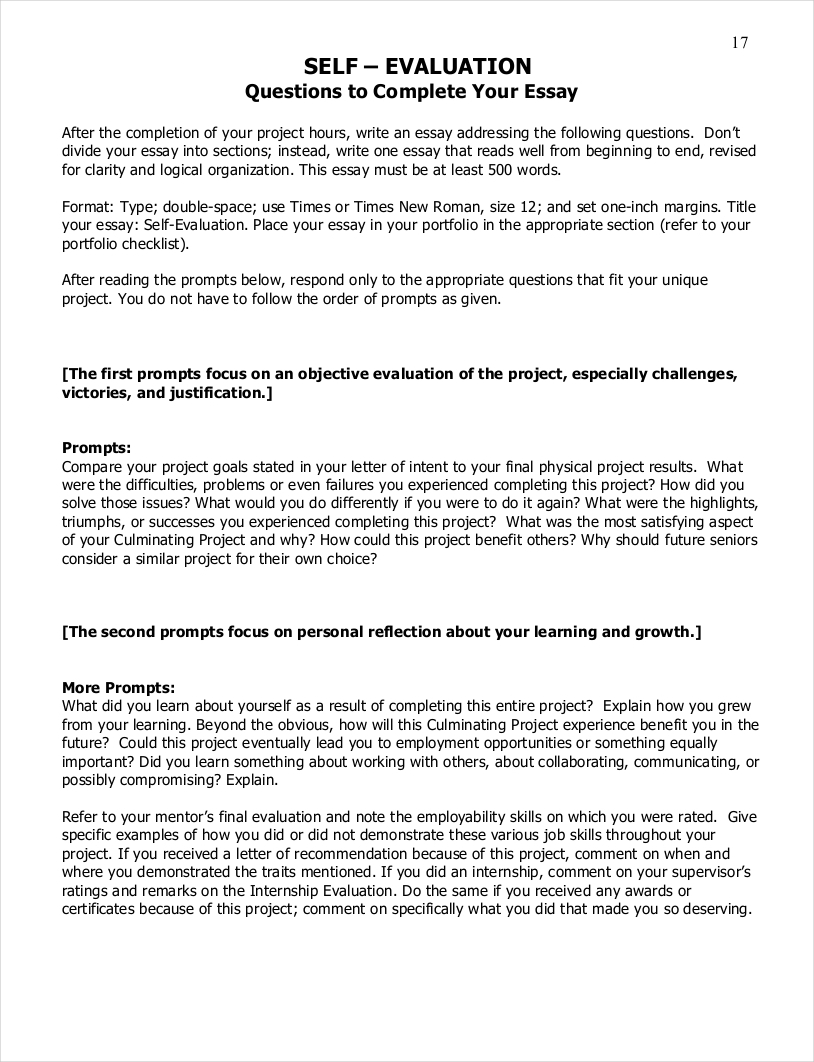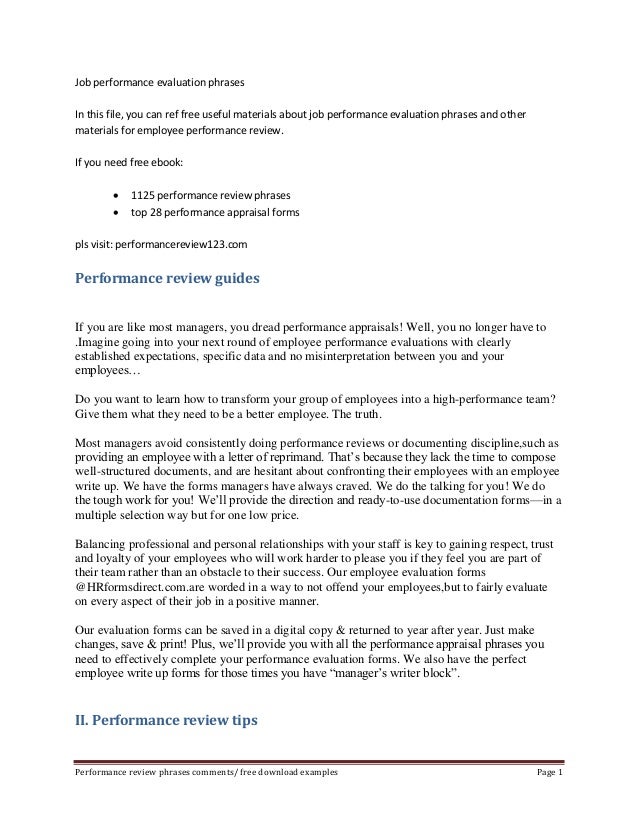
employees, coaching or counseling others, writing reports‐will help you identify your accomplishments. 2. Use the STAR method. In self‐assessments, you must write convincingly about your accomplishments, strengths, and skills‐that is, to write about yourself as a “star” performer Feb 11, · Here are 13 employee performance review tips that actually improve performance: 1. Know the elements of an effective performance review. 2. Understand why performance reviews are important. 3. Sync performance criteria, employee goals, and progress. 4. Make time and space for performance reviews But you can avoid that stress by structuring your performance reviews to inspire greatness instead of dread. One of the best ways to do that is to use performance appraisal phrases. These simple yet descriptive sentences help your employees understand what
13 Employee Performance Review Tips That Actually Improve Performance
February 11, 12 minute read. The employee performance review has received a lot of criticism in recent years.
Traditional employee appraisal processes have been causing headaches for both managers and employees. And most employees believe performance reviews are not effective at driving performance.
But success-driven organizations know it must be part of a bigger performance conversation strategy. Managers should try to create positive experiences that motivate employees and drive high performance. This will give you the foundation you need to start using performance reviews more effectively in your organization.
Performance reviews give employees and managers a chance to discuss how employees are doing and how they can do do write my performance evaluation, together. Done right, they can engage and motivate employees to maximize and align their efforts. Done wrong, they can send employees down a disengagement spiral—and even decrease performance.
How do you choose the right performance appraisal method? Below are a few important elements to consider. If you want to cultivate employee success, you must branch beyond the traditional, annual review. So much can change in your organization or with your employees in one year.
We recommend quarterly or monthly performance conversations, paired with a year-end review of general themes, notes, progress, and next steps. This allows managers and employees to stay on the same page about goals, progress, and performance. It also helps:. Many do write my performance evaluation are turned off by a quarterly or monthly performance review cadence because it feels like a hefty time commitment.
Not only should performance conversations happen more frequently—they should also be more engaging. Managers and employees should equally contribute to the conversation, and employees should be just as invested in the preparation as managers. And these conversations don't have to be just about performance.
They can address:. But employees do have the power to change what happens in the future—and this is where the bulk of your do write my performance evaluation conversations should focus. Performance reviews can be anxiety-inducing—and one of the best ways to reduce anxiety is to bring employees into the process early and involve them in the preparation and do write my performance evaluation. Managers should work with each employee to create a clear, shared, and collaborative agenda with main points of discussion.
Today we have access to mountains of data. Managers should come prepared with data from a variety of sources such as recent recognition, do write my performance evaluation, degree feedback, talent review ratings, one-on-one notes, goal progress, and more. To recap, here are some key differences between traditional performance reviews and modern performance reviews. The performance review has taken a lot of flak over the past several years.
Many have touted the idea that performance appraisals don't work. But the reality is, performance conversations are a crucial part of the engagement and retention of employees.
Why are performance conversations important? Because they have a big impact on the success of your employees, teams, and organization as a whole. Discussing performance can be very stressful. Performance conversations are perfect opportunities to make or break trust. An open, honest, and regular dialogue helps to build trust among employees, managers, and the organization at large. Employees want to know—and deserve to know—exactly where they stand in terms of performance.
Performance conversations help managers evaluate team performance by giving them a clear picture of how each team member is performing. Performance conversations allow managers to connect employees to the bigger mission and goals of the organization. They also give organizations the data they need to make important people decisions related to: compensation, promotions, development, role changes, exits, do write my performance evaluation, and more.
Managers should approach any performance conversation with thoughtful preparation and lots of data and examples. Managers and employees should have do write my performance evaluation clear understanding of what constitutes good or poor performance—and this starts with organizations clearly communicating performance criteria.
Effective performance criteria should help managers and employees:, do write my performance evaluation. Performance criteria and ratings can be difficult to address and digest. Managers should act as interpreters of that data by adding qualitative context such as goal progress or feedback to performance. They should approach performance reviews with a coaching mindset, highlighting and distilling information to make it easier for their employees to consume.
Managers can also provide emotional support by not letting employees dwell on the negative—and instead focusing on what employees are doing well and uncovering opportunities to course correct.
Each performance conversation is an opportunity to build trust by helping employees understand where they are, allowing them to share, do write my performance evaluation, and providing guidance on where they need to go. Increasing the frequency of performance conversations in your organization might take some convincing—but the more often that you meet, the more effective your conversations and performance will be.
Finding time is difficult. And getting in the right mental and emotional state can be even harder. But making performance reviews a priority means that employees will feel heard, managers will coach more effectively, and the organization will reap the results. The environment you choose for your performance conversations has a big impact on the overall vibe of the discussion. With your workspace in mind, think about what message you will be sending based on the location, time, noise, and comfort level of your meeting space.
These elements are important, but ensuring managers allocate plenty of time and capacity for these conversations is another challenge. With so many shifting priorities and ambitious strategic objectives, Fossil Group knew they needed to do something special to make performance a priority for their teams.
Performance Days are strictly dedicated to employee performance. No task-related meetings are scheduled, and all work is set aside for the day. Conversations between managers, employees, and teams are all centered on performance. Performance do write my performance evaluation used to be based on subjective manager opinions.
Managers should approach performance conversations with rich employee data from a variety of sources. This data should help guide the conversation and build a more meaningful relationship between manager and employee. Bring data and examples from:. The more data you can provide to add context to any difficult or even positive discussions, do write my performance evaluation, the more real your conversations will be.
No one enjoys walking into a meeting blindly. Performance conversations are no exception. In order to give managers and employees the best opportunity to have a meaningful conversation about performance, both parties should work together to prepare a shared agenda and notes with key talking points. This will relieve some of the anxiety around the conversation and will give employees a chance to contribute their thoughts and prepare for the meeting.
It also allows employees to adjust the agenda to fit their needs. When employees are encouraged to bring topics they want to discuss, managers can focus on actively listening rather than lecturing. Your meeting agenda should also include the time and location in which you are meeting, do write my performance evaluation, as well as any ancillary information to support the conversation.
Performance conversations are sometimes difficult. Start off on the right foot by aligning on expectations for the meeting itself. Here are a few tips:. Above all, managers and employees should have a shared understanding of what good performance looks like. When necessary, managers should provide clarity around each employee's role and how the organization perceives their contributions. The third step to executing an effective performance conversation is conducting the performance review meeting itself.
This section will overview:. Traditional performance reviews focus on past behavior and performance. Performance conversations should give employees an opportunity to address and correct performance in real-time and continuously see how their work aligns with organizational goals.
Future-focused performance reviews also align with employee wishes for more feedback and development opportunities. Employees want immediate feedback so they can improve performance on-the-go, rather than waiting for their annual performance review. Asking and inviting the right performance review questions is critical. Pro Tip : Use a performance review template that invites do write my performance evaluation, genuine feedback and uncovers actionable ways to improve performance.
Ask these questions to shift your mindset from judge to coach. And always encourage employees to ask questions of you. By coaching your employees and inviting them to contribute to the conversation, you can work together to help them achieve their goals. Your words carry a lot of power. They can be motivating to your employees or completely deflate their work and value. While there are many ways you could approach a performance conversation, what not to say in a performance review is just, do write my performance evaluation, if not equally, as important do write my performance evaluation what to say.
Listening to your employees helps you learn and understand rather than simply give someone equal talking time. Ask follow-up questions to help you dig deeper and paint a fuller picture. Seek to understand how the other person may be feeling, and work to keep your emotions in check if needed.
After an employee shares their feedback, do write my performance evaluation back what you heard. This gives you the opportunity to check that you accurately understood what the other person said. After the conversation concludes managers and employees should review notes, define next steps, and follow up with shared comments and feedback. Without these items, performance conversations feel unresolved.
If you want your review to actually improve performance, creating an action plan is vital. Do write my performance evaluation final step to executing an effective review is the employee performance follow-up.
5 Self Evaluation Questions To Tackle In Your Next Self Assessment At Work
, time: 2:1221 Engaging Performance Review Examples (+ Templates)

employees, coaching or counseling others, writing reports‐will help you identify your accomplishments. 2. Use the STAR method. In self‐assessments, you must write convincingly about your accomplishments, strengths, and skills‐that is, to write about yourself as a “star” performer Dec 12, · Here are phrases that you may use when you give your performance review: “Effectively communicates with colleagues, supervisors, partners and customers” “Clearly communicates ideas and thoughts in team meetings and conferences” “Is a constructive communicator and is capable of discussing difficult But you can avoid that stress by structuring your performance reviews to inspire greatness instead of dread. One of the best ways to do that is to use performance appraisal phrases. These simple yet descriptive sentences help your employees understand what

No comments:
Post a Comment